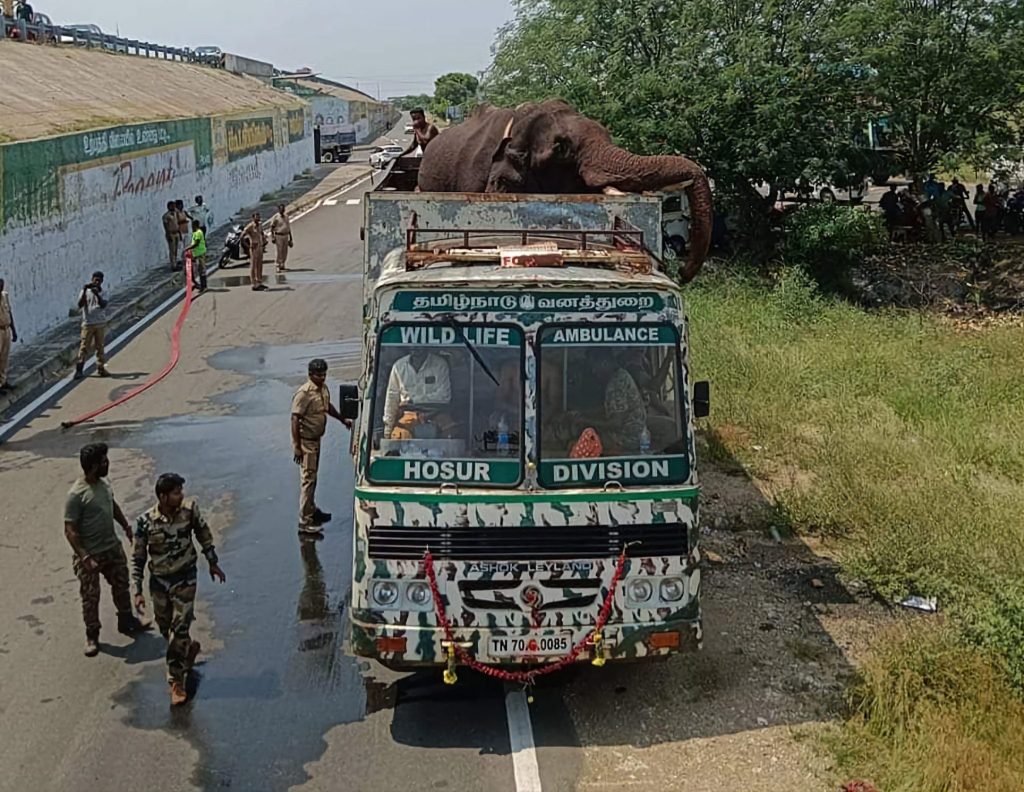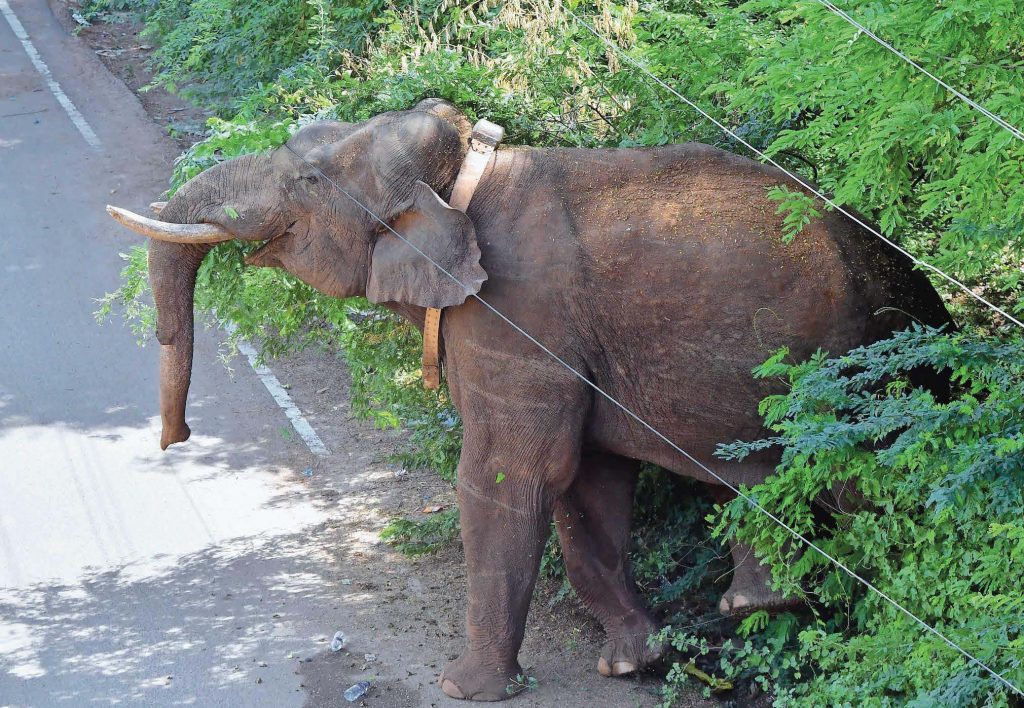
Mercifully, the 100-odd families of Chinnakanal want Ari Komban back. They fear that driving a poor animal out of his home and hearth will bring a curse on their heads and take their peace and prosperity away.
A 32-year-old male elephant, Ari Komban, has been in the news for various reasons. First, it was due to his raids of ration shops in the hamlets close to the forest in Chinnakanal in the Idukki district of Kerala in search of rice, resulting in him being nicknamed Ari Komban (ari means rice and Komban means bull elephant in Malayalam) by the residents of the area. Later it was due to the fact that he began raiding homes after the ration shops were moved to a distant location so that the tusker could not get to them. Ari Komban is also accused of having killed seven people during his forays into the areas adjoining the forests in search of his favourite food. However, there is no proof to substantiate these claims that were mainly made by a local politician in order to buttress his case against the voiceless animal that has no means to defend itself.
This saga of man-elephant conflict had been going on for over five years and ultimately after the villagers, egged on by the land mafia and encouraged by the local politicians, raised a major hue and cry against the marauding elephant, Ari Komban was shifted to the forests of Tamil Nadu. But over there, too, Ari Komban found his way to human habitats, either in a bid to return to his beloved forest home in Chinnakanal or in search of his comfort food, rice. In the end, after that he was tranquilised and captured and left deep into the Upper Kodayar area of Muthukuzhi forest near the Tamil Nadu-Kerala border with a satellite radio collar around his neck to begin a “new life.”
However, this new life is easier said than done! If he stays there in the Tamil Nadu forests, he will have to fight for territory with younger male elephants. As it is, Ari Komban is blind in one eye, has a severe cut on his trunk, and has sustained injuries during multiple attempts to translocate him.
Even though, the government officials at the moment are gung ho about the fact that Ari Komban is settling down in his new habitat and PR photos are being released to the Press showing how “happy” he is in his new “tranquil” haven I don’t think that we have heard the last of Ari Komban.
Remember, elephants are complex social creatures just like us humans. They have families, relationships, a complex social structure and last but not the least they have “elephantine memories.” So, it is not very likely that Ari Komban is going to forget about his family and friends anytime soon. He will try and make his way back to his family as he has many children that he sired in the forests of Chinnakanal. Though male elephants leave their herd once they enter their teens, they do keep coming back to meet their family as they have lasting bonds just like us humans. They mourn their dead, miss their loved ones and suffer separation anxiety just like us humans.
So this is the life we humans have decided for Ari Komban for no fault of his own? And I say for no fault of his own because despite all the media reports, and what the local politicians and villagers said, it was not Ari Komban who ventured into human habitats because it was the other way round. The humans had encroached on his home. In fact, media reports quote locals as saying that though humans had encroached on the forest area where the majestic elephant and his herd and ancestors had lived for centuries, Ari Komban did not mind sharing his habitat with humans till they built their homes with bamboo and mud. But he definitely took a stand to protect his turf once the humans began building brick and mortar homes, as he started raiding and destroying shops. His behaviour is akin to a human who is trying to drive encroachers off his property.
There was no need to drive Ari Komban out of his own home. The 100-odd families who had encroached on his forest could have been relocated and if media reports are to be believed they were actually willing to do so. But the land mafia and the local politicians engineered a situation to suit their nefarious purposes and painted the tusker as a villain and got him removed from his own ancestral home. What a travesty of justice.
I don’t think that the Kerala Forest Department or the people living in Chinnakanal have seen the last of Ari Komban because he used to return to the spot where his mother died in 1984 when he was just a few months old. Just like a human visits a grave site of a loved one on their anniversaries, this orphaned tusker visits the place where his mother died, every year. He is bound to try and find his way back to that spot that is etched forever in his heart and memory. Plus, he has his herd, his family, his children and his friends there. That is his ancestral land and he is bound to try and return to his homeland.
Man-animal conflict is on the rise across the country and uprooting one elephant and sending him into exile away from all that he loves is not going to solve the problem. According to the last elephant census that was held in the country in 2017, India has close to 30,000 wild elephants and around 60 per cent of all wild Asian elephants. Loss of habitat, fragmentation and relentless encroachments by humans in forest lands often forces them to enter human habitats and raid crops, homes and plantations, leading to conflicts like the one that Ari Komban is caught in the middle of.
When news of raids or killings by elephants is splashed across TV channels and newspapers, few realize that it is we who have forced the animals into this situation through rampant exploitation of their habitat. They are pushed to the wall by our greed and senseless sanctioning of development projects by Governments who don’t pause to think about the consequences of their action on the animal kingdom.
Few realize that in this poignant saga of a marauding elephant, Ari Komban is actually the victim and not the villain that he is being painted out to be. It would have been better to leave Ari Komban in his part of the world and relocate the 100-odd families to another place. However, the Kerala Forest Department seems to have played right into the hands of the rich and powerful and did not show real will to ensure that Ari Komban his land rights. But, at the end of the day, do the rights of a voiceless animal really matter to the vast majority?

The Kerala Forest Department could have taken a page out of the Chhattisgarh Forest Department’s book which has developed an artificial intelligence (AI)-based application which can alert users about the movement of elephants in their vicinity. The ‘Chhattisgarh Elephant Tracking and Alert’ app that is being used in Udanti-Sitanadi tiger reserve on a pilot basis uses inputs provided by the ‘Hathi Mitra Dal’ (groups of local volunteers) which keeps tabs on the movement of jumbos to send alert calls and messages. This will help prevent incidents of human-elephant conflict in the reserve that is spread across Gariaband and Dhamtari districts and has been witnessing incidents of these conflicts for nearly a decade.
The ‘Hathi Mitra Dal’ has been using Open Data Kit (ODK- an open source application) for the last one year to feed data about location and movement of elephants in the affected years. This ODK app works both in online mode (in real time) and offline mode (when trackers are outside the mobile network area). The App will use inputs fed into the ODK App to send automated alert messages and calls to those whose mobile numbers and GPS location are stored in the app. Whenever an elephant is within 10 km of any village, its residents will get automated calls, text messages and WhatsApp alerts if their mobile numbers are registered with the system. The app can also be used for sending alerts about the presence of other wild animals like leopards, bears and wild buffaloes.
In a similar way, Karnataka also set up a task force headed by the Deputy Conservator of Forests in Hassan, Chikmagalur, Mysore and Kodagu districts to reduce man-elephant conflict. The task force patrols areas inhabited by elephants, monitors the movements of lone elephants or herds in human habitation, fields or coffee estates, and drives them back into forests under the direction of the Deputy Conservator of Forests. They share information about the movement of wild elephants and warn people not to move in the forest areas. Karnataka has also set up a control room in the headquarters of every task force and shared the contact number with people residing near the forest areas. Plus the task force members have been provided with walkie-talkies, guns and crackers to drive the wild jumbos back into the forests.
We have to find more humane ways to deal with man animal conflict that is growing with each passing day due to the burgeoning human population. India has become the most populous nation in the world, surpassing even China. One wonders how many more animals will have their lives uprooted and even give up their lives in order to support human lives. How is it that we presume that our lives are more important than animal lives? What is it that we have given to the planet? Each and every microorganism, bacteria, insect, animal, bird, fish and plant plays a significant role in keeping this planet alive and healthy. Humans are the only ones who play a hugely destructive role and have destroyed the delicate balance of nature. Our populations continue to grow mindlessly and we push other species inhabiting this planet closer and closer to the brink of extinction, without realising the paradox that in destroying other beneficial species we are actually signing our own death warrant.
It is heartening to note that the 100 families of Chinnakanal want Ari Komban back. They fear that driving a poor animal out of his home and hearth will bring a curse on their heads, and take their peace and prosperity away. Driven by their guilt and remorse over causing this trauma and separation to the tusker and his family they staged a road roko on the Suryanelli – Bodimettu road recently demanding that the elephant be brought back home. I just hope that the forest department and the politicians of Kerala see reason and reunite the beautiful tusker with his family and friends. After his mother’s death, Ari Komban became an orphan. Let’s not make him homeless and take his family and friends away from him too.













